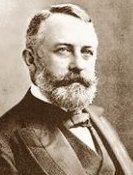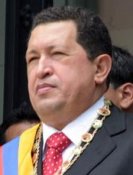If you have the time to set aside, I’d strongly encourage you to read Socialism to the Highest Bidder, written by Nachie of the Red & Anarchist Action Network (2006-07-11). I mention the If
because the time involved could be considerable; it’s a long and detailed essay, but rewarding if you’re interested in the topic. Here are some of the things that I took away from reading it.
When organized oil workers went on strike in 2003, Chávez and his revolutionary bureaucracy took the opportunity to fire 18,000 workers, to hire scabs and political favorites to cross the picket lines and replace them, and to create a new yellow-dog union federation that would support the official line of the government and the government-owned oil company:
The most important effect of the lockout was that it allowed Chávez to fire 18,000 PDVSA
employees for walking off the job, including most of its technical staff of geologists,
geophysicists and reservoir engineers, and then refill those posts with political supporters (this is
the point at which the new
PDVSA became the people's
). In this process all
forms of budding worker's self-management were quickly rolled back under the assurance that
PDVSA now belonged to the people
. Workers also managed to reoccupy a handful of
other small factories, which are now being absorbed by the state and tokenized as symbols of
co-management
and glorious revolution. … The much-vaunted officialist UNT, (National
Union of Workers) which was set up in April of 2003 in response to the collaboration of the old
CTV (Confederation of Workers of Venezuela) with the bosses' lockout, is certainly doing the
bulk of the labor organizing in the country, but even their efforts are limited in scope and have
stalled over infighting, negotiations dealing with how exactly to make the union as participative
as possible, and a lack of follow-through on the militant tactics such as factory occupations
that they were supposedly to be advancing.
— Nachie, Red & Anarchist Action Network (2006-07-11): Venezuela, Socialism to the Highest Bidder


The creatures outside looked from pig to man, and from man to pig, and from pig to man again; but already it was impossible to say which was which.
This massive campaign of strike-breaking, union scabbing, and union-busting, which would have done Frick or Carnegie proud, is passed off today by compliant State Socialists in the U.S. as if it were a triumph for the working class. Meanwhile, in Argentina and then increasingly throughout South America, workers began to reclaim abandoned factories, and to run them under participatory, rotating worker self-management (autogesti?@c3;b3;n); when Chávez and his revolutionary bureaucracy took notice of the trend, they started to heavily promote their own favored alternative: government expropriation of factories and the institution of co-management
(cogesti?@c3;b3;n), in which workers’ associations pay for the government’s help by ceding a substantial share of ownership (often up to 51%) and management (often filled by political appointees) to the Venezuelan government. The excuse for this gutting of worker management in favor of state bossism is that by putting the factory partly under government command, co-management ensures that it will produce in the interests of the public
or the nation
— as those interests are defined by detached government bureaucrats, rather than by the actual members of the public or the nation who happen to be engaged in doing all the work of making, buying, or using the factory’s products.
When Chávez, former leader of a military coup d’etat, rose to power, he took it upon himself to send out the military in virtually every one of his government welfare projects, and rather than altering, containing, or abolishing the existing military and the state security forces, he and his bureaucracy have taken deliberate efforts to militarize the civilian police forces and integrate paramilitary training and discipline throughout the government schooling system that they have been so assiduously expanding and remaking in their own Bolivarian image:
There has been absolutely no real judicial reform in the Fifth Republic, and as long as Chávez
himself refuses to address this issue the rest of the government, for whom politics is merely a
balancing act in which you do your best to appear in complete agreement with anything the
president says, will continue to do nothing. In fact the Bolivarian Revolution has given the state
a softer, friendlier
image, which has encouraged an unprecedented rise in urban crime
by those who expect to be able to get away with more. This has in turn been used by the
government as a justification for the strengthening of the pre-existing repressive apparatus,
which in April culminated in the chief of Caracas' police being replaced with a FAN brigadier
general.
For all the talk of tribunals against impunity
to investigate state repression, these
bodies have been completely stacked with members of the National Guard and political armed
forces. On January 30th in Barquisimeto, a committee of the victims and families of police abuse
released a communiqué condemning the tribunals; these people guarantee the social peace,
generate justice, and therefore the state cannot dismantle its own gang, it will never judge,
much less condemn, itself.
The continuation of police abuse is one of the most underplayed
aspects of the Bolivarian Government, especially considering the lack of responses to it. In
March, 21 year old Iván Padilla Alliot was severely beaten by the DISP and told
that he was going to be disappeared
after he ran in front of a government convoy
while crossing through Caracas' hectic traffic. Only when it was discovered that he was the son
of the Vice Minister of Culture was he released. If such a mistake
is possible, one can
only guess as to what happens when the pigs grab someone who's father is not a politician.
While Chávez speaks almost endlessly about his plans to benignly integrate the armed forces into
society, in practice it is Venezuelan society that is forced to take on the nature of the armed
forces. Although Article 61 of the Constitution guarantees freedom of conscience, Articles 130
and 134 then declare it obligatory to defend the patria
.
Among the largest changes we now see the country undergoing is the implementation of
obligatory pre-military
programs in all schools, which seek to indoctrinate the youth with
a bizarre blend of nationalism and socialism
(sound familiar?). These programs will of
course be complimented by a wide variety of centrally planned — and approved — education
initiatives, especially through the new Bolivarian University. This institution, which Chávez claims
now hosts more students than all the independent ones put together, is rigorously controlled by
the state so that all activism, cultural activities, and studies undertaken by the students fit into
the prefabricated mold of Bolivarian Socialism (Alan Woods, for example, being a typical guest
speaker). As a result one can expect to see significant deterioration in the quality and autonomy
of student struggle, which had previously characterized the universities as traditional points of
resistance throughout all of the past regimes. Meanwhile, like so many other
vertically-implemented projects of the state, the Bolivarian University has been failing to live up
to it's promise: the professor's union has publicly said that student desertion is at over 40%, and
attendance statistics have been manipulated by the government. The curriculum has also had to
be completely redesigned three times in the past four years.
— Nachie, Red & Anarchist Action Network (2006-07-11): Venezuela, Socialism to the Highest Bidder
In summary:
The Bolivarian Revolution and Chávez as a personality are increasingly intolerant of criticism, and
even more so of projects that fall outside of their control. The much-lauded and incredibly tiny
urban garden projects in Caracas, which were deliberately dressed up with things like premium
fertilizer to look more impressive in the run-up to the FSM, actually predate the government but
have been turned into clients of the state with the promise of funding. This has happened to
untold numbers of community projects and autonomous organizations, with those who refuse to
collaborate inevitably being called golpistas. As Humberto Decarli
explained to me, Chávez' interest in Cuba is not so much an ideological common ground as it is
an admiration for the raw efficiency of the repressive mechanisms that have allowed Castro to
remain in power for so long, and a key part of this is the absorption or dismantling of all
institutions and movements outside of the state.
— Nachie, Red & Anarchist Action Network (2006-07-11): Venezuela, Socialism to the Highest Bidder
Or, in other words, under the name and banner of a socialist
and revolutionary
movement, the emerging Boli-bureaucracy has used subsidy, co-optation, conversion, and violent repression to devour any and every independent project or association, whenever, wherever, and however it could get them into its ravenous maw. All too many Potemkin-tour Progressives
and authoritarian Leftists have deluded themselves into believing that this process of the endlessly self-aggrandizing State bureaucracy engorging itself on the living remains of industrial and civil society, is something that Leftist, grassroots, and populist tendencies ought for some reason to support; the Libertarian Left — i.e., the real, anarchistic Left, unencumbered by the reactionary apparatus of Authority — knows better than that.
Government! Ah! we shall still have enough of it, and to spare. Know well that there is nothing more counter-revolutionary than the Government. Whatever liberalism it pretends, whatever name it assumes, the Revolution repudiates it: its fate is to be absorbed in the industrial organization.
— Pierre-Joseph Proudhon (1851), Reaction Causes Revolution, General Idea of the Revolution in the Nineteenth Century


